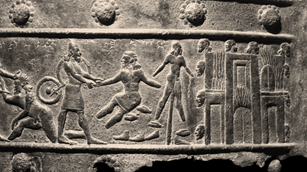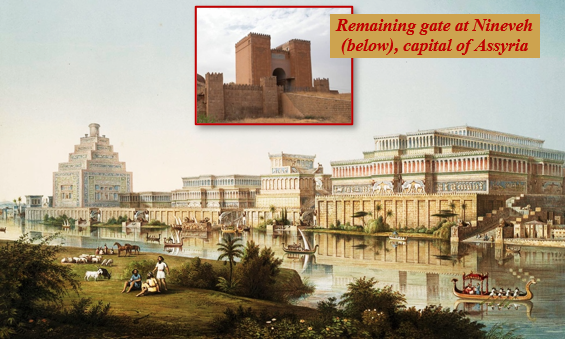One possible reason the 8th century prophet Jonah was missing (word hints in purple) from last week’s chart of Hebrew and Assyrian kings is mainstream Biblical scholars view Jonah’s account as “entirely ahistorical”, a parody written hundreds of years after the fact and mistakenly interpreted as prophecy. Yet, an analysis of the Assyrian Limmu list discloses a greater miracle than Jonah’s whale of a trip.
As you may recall, the list documents over a 1,000 years of royal Assyrian history, connecting social and solar events to a king’s annual reign. It meticulously recorded the Assyrian’s tradition of wars abroad. Every year the king went out on a campaign - not for votes, but for his enemies’ heads. Their treatment of captives was most gruesome, with a few examples memorialized in copper on an Assyrian gate at Balawat (see picture, right).
 |
| Relief cast in bronze, Balawat Gate, depicting an Assyrian cutting off the hands and feet of a live captive while another is skewered on a pole. Notice skulls on the walls. British Museum. |
They would cut off their enemies’ hands and feet while still alive, rip off ears and tongues, or skewer them on long poles. They would flay them and drape the city walls with their skins. Some they would burn alive or decapitate them and hang their heads for all to see. One king wore a necklace of enemy skulls. This is in complete accord with Nahum 3:1 calling Nineveh the bloody city. Given their annual military expeditions to conquer and torture, you can see why Israel feared Assyria.
The prophet Jonah records his unusual but productive missionary trip, whose short message of God’s imminent doom caused 120,000 Assyrians from king to kine to repent. The Limmu list records something very peculiar happening in Assyria during this precise window of time. They stopped going to war! Known as the 8th century “Period of Stagnation”, Shalmaneser IV had a continuous military campaign every single year throughout his reign for 37 years, followed by Ashur-dan III for another 4 years, who strangely stopped in 769 BC. All the way through king Ashur-nirari V, military campaigns happened only 8 out of 23 years. There is no explanation for why “the king stayed in the land”. This is not Assyrian behavior; you either went to war or you were overthrown. God, however, records the Assyrian king’s response: let them turn every one from his evil way, and from the violence that is in their hands. (Jonah 3:8). This also matches 2Kings 14:23-27, where God spared Israel under king Jeroboam II to give them one last chance to repent. Pacifist king Ashur-nirari V reigned 9 years before he was overthrown by the infamous Tiglath Pileser III. Returning to old traditions, he and later Assyrian kings attacked and deported Israel from 740-722 BC (1Chronicles 5:26, 2Kings 17:3,6; 18:9-13).
Other proofs of Jonah’s historical accuracy were found by Sir Henry Lanyard, discoverer of the Limmu list. His extensive site surveys of Nineveh in 1845-47 noted an immense 8th century BC metropolis (see Lanyard’s depiction, 1853, below).

Judging from four nearby city mounds, he traced a circumference of ~60 miles. 1st century BC Greek Historian Diodorus Siculus wrote Nineveh was 480 stadia (89 kilometers, or 55 miles) in circumference. 5th century BC historian Xenophon said her walls were 98 feet high and 49 feet thick, with a 2,000-acre city hub. If a man could walk 20 miles a day, Jonah’s description that Nineveh was an exceeding great city of three days' journey appears historically accurate. Once again, God’s record is right.
Source: https://armstronginstitute.org/312-jonahs-remarkably-accurate-account-of-assyria
Like this? Consider sharing it to Facebook by clicking the linked icon below.
